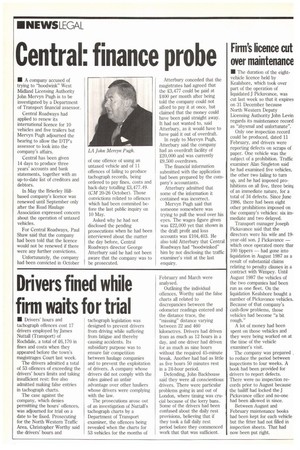Drivers fined while firm waits for trial
Page 12

If you've noticed an error in this article please click here to report it so we can fix it.
• Drivers' hours and tachograph offences cost 17 drivers employed by James Nuttall (Transport) of Rochdale, a total of £6,170 in fines and costs when they appeared before the town's magistrages Court last week.
The drivers admitted a total of 53 offences of exceeding the drivers' hours limits and taking insufficient rest: five also admitted making false entries in tachograph charts.
The case against the company, which denies permitting the hours' offences, was adjourned for trial on a date to be fixed. Prosecuting for the North Western Traffic Area, Christopher Worthy said the drivers' hours and tachograph legislation was designed to prevent drivers from driving while suffering from fatigue and thereby causing accidents. Its subsidiary purpose was to ensure fair competition between haulage companies and to prevent the exploitation of drivers. A company whose drivers did not comply with the rules gained an unfair advantage over other hauliers whose drivers were complying with the law.
The prosecutions arose out of an investigation of Nuttall's tachograph charts by a Department of Transport examiner, the offences being revealed when the charts for 53 vehicles for the months of February and March were analysed.
Outlining the individual offences, Worthy said the false charts all related to discrepancies between the odometer readings entered and the distance trace, the "missing" distance varying between 22 and 460 kilometres. Drivers had driven from as much as 12 hours in a day, and one driver had driven for as much as nine hours without the required 45-minute break. Another had had as little as five hours 50 minutes rest in a 24-hour period.
Defending, John Backhouse said they were all conscientious drivers. There were particular problems going in and out of London, where timing was crucial because of the lorry bans. Some of the drivers had been confused about the daily rest provisions, believing that if they took a full daily rest period before they commenced work that that was sufficient.














































































